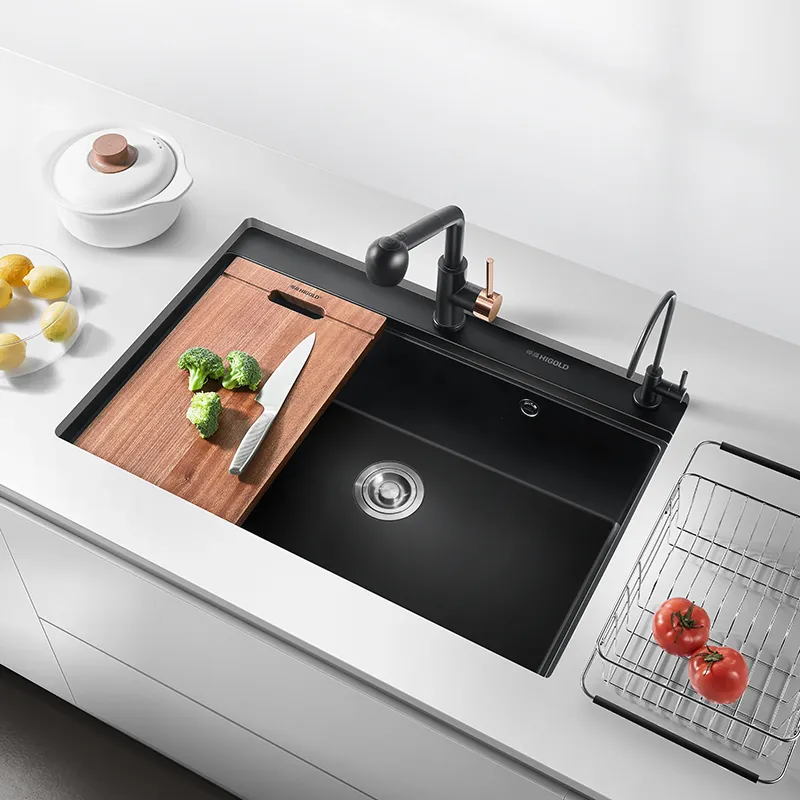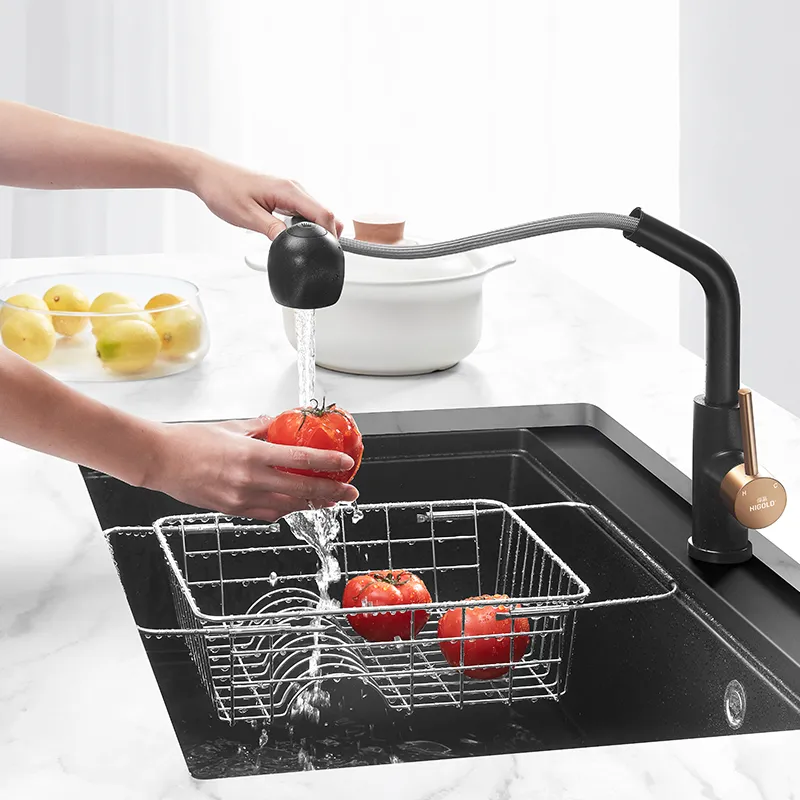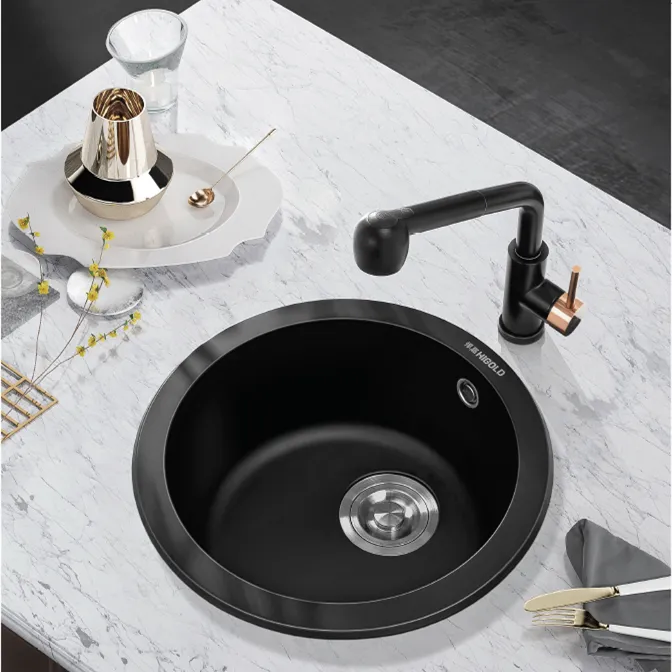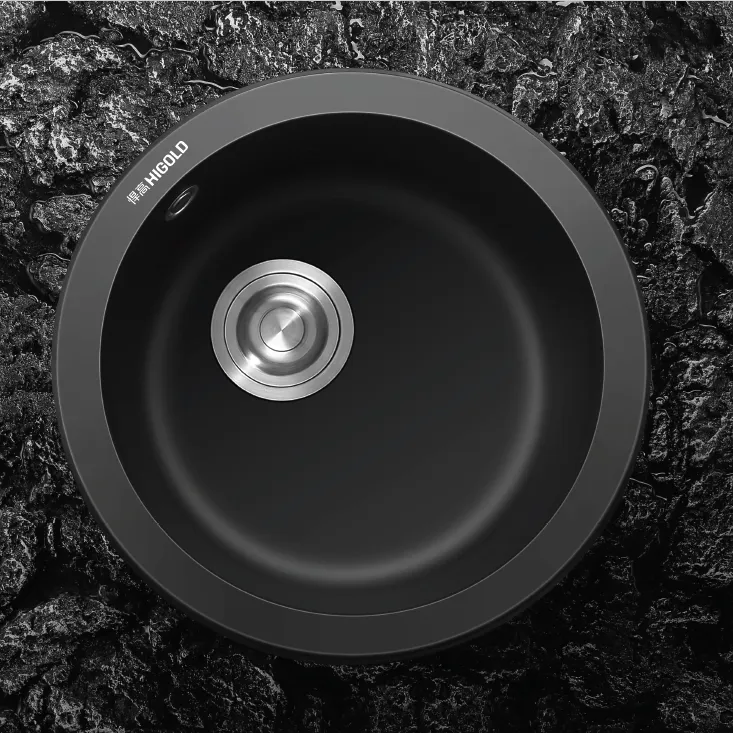Black quartz sinks not only complement dark or light countertops but also enhance the overall quality of the kitchen. However, despite their high hardness and wear resistance, black quartz sinks can still develop scratches during daily use due to knives, metal pots, or improper handling.
Faced with these scratches, many consumers ask the same question: "How do I remove scratches from a black quartz sink?"
This article will focus on this core question, providing a detailed explanation from multiple perspectives, including the material properties of black quartz sinks, the causes of scratches, treatment methods for different scratch severity levels, cleaning and maintenance principles, and daily prevention methods. We strive to provide readers with professional and systematic answers.

What are the material properties of black quartz sinks?
To understand how to remove scratches, it's important to first understand the material characteristics of black quartz sinks.
1. Composition
Black quartz sinks are typically made by pressing a mixture of quartz sand, polymer resin, and special pigments. The quartz content is often over 70%, giving the sink exceptional hardness and scratch resistance.
2. Surface Texture
Black quartz sinks typically have a matte or finely brushed finish. Darker hues can visually mask minor imperfections, but they can also make white or light-colored scratches more noticeable.
3. Physical Properties
Quartz sinks are highly hard, but their internal structure is somewhat brittle compared to metal. Sharp scratches can leave shallow marks on the surface, while impacts from heavy objects can cause deep marks or chips.
Thus, while black quartz sinks are durable, they are not invulnerable, and scratches are an inevitable concern during daily use.

What are the common causes of scratches on black quartz sinks?
1. Friction from metal utensils
When washing pots and pans or using knives, direct contact with the black quartz sink can easily leave marks. Stainless steel pots and pans or the rough edges of ironware are particularly prone to scratching.
2. Impact from Hard Particles
When washing food with sand or hard impurities, these particles rub against the sink surface under the running water, potentially causing scratches.
3. Improper Cleaning Tools
Using harsh cleaning tools such as steel wool or coarse-grit cleaning cloths to clean black quartz sinks can aggravate the surface and cause scratches.
4. Accumulated Use
Even with careful daily handling, black quartz sinks may gradually develop shallow scratches due to minor friction over time, forming surface wear bands.
Understanding these causes will help you find appropriate solutions when dealing with scratches and prevent recurring problems.

Black Quartz Sinks: Scratch Severity Classification and Treatment Principles
Before discussing scratch removal methods, it's necessary to first categorize scratches. Different scratch severity levels require different treatment methods.
1. Minor Scratches
Shallow surface scratches are usually only visible at certain angles or under strong light. These scratches have little impact on the sink's functionality and are primarily an aesthetic concern.
2. Moderate Scratches
Scratches significantly affect the surface texture, with slight indentations felt by hand. If left untreated, these scratches may become spots for stains and hinder cleaning.
3. Severe Scratches or Chips
Scratches are deep and may even contain chips or chips. This not only affects aesthetics but may also impair local durability.
Treatment Principles:
• Minor scratches: Polishing and cleaning are the primary treatment.
• Moderate scratches: Specialized repair materials or fine grinding are required.
• Severe scratches: Professional repair may be necessary, and replacement of the component may even be considered.
How to remove scratches from black quartz sinks?
1. Treatment of Minor Scratches
For shallow surface scratches, the following methods can be used:
• Cleaning with a soft cloth and warm water: First, use a neutral detergent and a soft cloth to repeatedly wipe to remove any remaining dirt and make the scratch less noticeable.
• Baking Soda Paste: Mix baking soda and a small amount of water to form a paste. Apply it to the scratched area and rub gently with a soft cloth in circular motions for a gentle abrasive effect.
• Special Quartz Sink Polishing Compound: There are commercially available polishing and repair agents specifically for quartz sinks that are effective for minor scratches.
2. Repairing Moderate Scratches
When scratches have affected the surface texture, you can try the following methods:
• Wet Sanding with Fine Sandpaper: Use wet sandpaper with a grit of 2000 or higher. Dip it in water and gently sand the scratched area, maintaining an even pressure to avoid over-sanding and causing color shifts.
• Quartz Repair Agent: Apply the repair agent to the scratched area and rub it repeatedly with a polishing cloth to fill in small grooves and restore the surface to a smooth surface.
• Nano-Repair Solution: Some products use nanoparticles to fill scratches. After curing for a period of time, they can effectively cover moderate scratches.
3. Solutions for Severe Scratches
When deep scratches or chips appear on a black quartz sink:
• Professional Repair: Contact a professional to fill the scratches with a resin repair material and then restore the surface through mechanical polishing.
• Replacement: If the damage is extensive, the entire sink may need to be replaced. While this may be more expensive, it will permanently resolve the problem.

Precautions for Treating Scratches on Black Quartz Sinks
1. Avoid Using Coarse Grit Tools
Using too low-grit sandpaper or abrasive cleaning pads can extend the scratch, potentially damaging the result.
2. Control Sanding Pressure
Even when using high-grit sandpaper, be gentle and patient. Excessive pressure can cause localized dents and even damage the surface structure.
3. Prevent Color Variation
After sanding or polishing, black quartz sinks may exhibit localized differences in brightness. Therefore, the working area should be appropriately wide to ensure a natural transition.
4. Avoid Strong Acids and Alkali Cleaners
These chemicals can corrode the resin in the quartz sink, causing the surface to lose its luster.
5. Maintain a clean operating environment
During the repair process, avoid dust or hard particles, as these can cause new scratches.
How to prevent scratches on black quartz sinks?
Besides repair, prevention is even more important. The following methods can effectively reduce the frequency of scratches:
• Use a protective mat: Place a silicone or stainless steel mesh rack under the bottom of your black quartz sink to prevent pots and pans from rubbing directly against the sink surface.
• Avoid direct contact with hard objects: When cleaning knives and metal utensils, try to do so on a cutting board or in a dedicated container to minimize contact with the sink.
• Choose gentle cleaning tools: For daily cleaning of your black quartz sink, use a sponge, soft cloth, or a dedicated cleaning brush to avoid scratching.
• Regular polishing: Lightly polish your black quartz sink every few months to repair potential minor scratches and maintain a smooth surface.
A Comprehensive Evaluation of Black Quartz Sink Scratches
After a comprehensive analysis, we conclude that:
Scratches on black quartz sinks are not irreparable. Minor scratches can be corrected with daily polishing or cleaning. Moderate scratches can be effectively treated with fine sandpaper or a specialized repair agent. Severe scratches require professional intervention.
The key to scratch removal lies in proper technique. Pay attention to the strength, tools, and cleaning agents used to remove the stain to avoid exacerbating the damage caused by improper repair.
Prevention is far more important than repair. Developing good usage and maintenance habits can significantly reduce the occurrence of scratches on black quartz sinks, thereby extending their beauty and lifespan.
"How do I remove scratches from a black quartz sink?"
The key to the answer lies in assessing the severity of the scratch, choosing a repair method, and maintaining it regularly.
While black quartz sinks have a high hardness and unique texture, they are not completely scratch-proof. Proper cleaning and proper handling during daily use can not only minimize scratches but also maintain the long-lasting beauty and quality of your black quartz sink. Therefore, scratches aren't an unavoidable pain point for black quartz sinks. With proper repair and maintenance, they can maintain their elegant and practical appearance for a long time.
What industries use Higold kitchen sinks besides residential markets?
Higold products are widely used in hotels, restaurants, office kitchens, and public housing projects. With heavy-duty stainless steel construction and global certifications, these sinks are suitable for both residential and commercial environments. This versatility allows wholesalers to serve multiple industries from a single trusted manufacturer.


